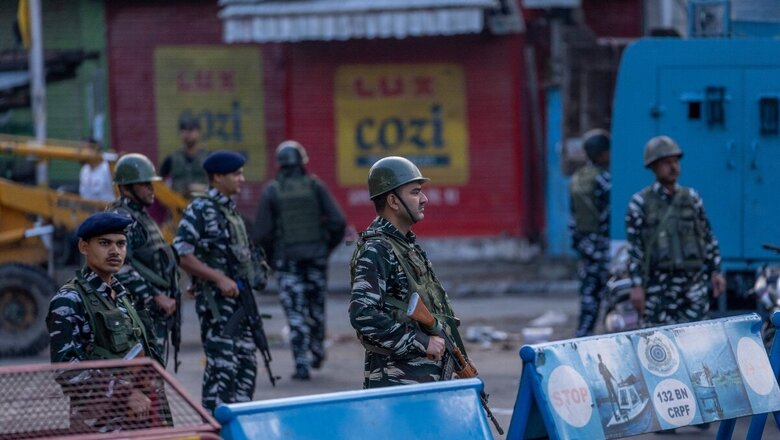
views
A remarkable drop in stone-pelting, hartal calls, casualties of civilians and security forces has been witnessed in Jammu and Kashmir since the abrogation of Article 370 sections, thus improving public safety, top government sources told CNN-News18 on Wednesday. According to official figures, the most significant change observed is the decrease in stone pelting incidents.
The period before August 5, 2019, recorded 5,050 such incidents, which significantly reduced to 445 in the time after that, marking a remarkable 92 per cent decrease, said officials.
This decrease signifies improved public order and a more peaceful environment, they added.
Official figures indicate that the number of hartal and bandh calls reduced from 302 in the time when Article 370 was in effect to 31 after that, reflecting a 90 per cent fall.
With each passing day, Kashmir has been recording a significant decrease in the number of terrorist incidents and related casualties, said officials.
This is attributed to a combination of factors, including increased security measures and intelligence gathering, targeted counterterrorism operations by J&K police, and security forces, and better coordination between them, they said.
Security operations
Security forces have conducted counterterrorism operations against various terror groups operating in J&K.
These operations have targeted the leadership and infrastructure of these terror groups, weakening their capabilities to carry out attacks.
International pressure
International pressure and diplomatic efforts aimed at reducing violence in J&K could have played a role in discouraging terror activities.
Local rejection of violence
Over time, sections of J&K’s local population have grown disillusioned with the violence and its impact on their lives. This has led to decreased local support for terror groups.
Economic development
Efforts to improve economic opportunities and development in the region helped to reduce the appeal of terrorism among the youth of J&K.
Improved living conditions and job prospects offered an alternative to engaging in violence.
Intelligence sharing
Improved intelligence sharing and cooperation between various security agencies have led to better anticipation of terror activities, preventing many attacks from taking place.
Infiltration challenges
Increased vigilance along the Line of Control (LoC) and improved border security measures have made it harder for terrorists to infiltrate into Kashmir, reducing their ability to carry out attacks.
Dismantling of militant networks
Successful operations against terror networks and their sympathisers in J&K disrupted their command structures, making it difficult for them to plan and execute attacks.
Public opinion
Negative public opinion about terrorism and its consequences have contributed to a decline in local recruitment in terror ranks and support for terror groups.
Social media and counter-radicalisation efforts
Efforts to counter online radicalisation through social media platforms and educational campaigns have influenced potential recruits to turn away from terrorism.
The Pulwama terror attack, which occurred on February 14, 2019, was a significant incident that had far-reaching implications for the situation in Kashmir and the broader India-Pakistan relations.
In this attack, a suicide bomber affiliated with the terror group Jaish-e-Mohammed targeted a convoy of paramilitary CRPF in Pulwama, Jammu and Kashmir, resulting in the deaths of over 40 soldiers.
In the aftermath of the Pulwama attack and subsequent events, various measures were taken to address terrorism and violence in Kashmir. These measures have contributed to a decline in terror incidents.
Some potential factors, according to officials, that could have led to the decline in terrorist incidents in J&K include:
Following the Pulwama attack, security forces in the region intensified their operations against terror groups, their leadership, and their infrastructure. This disrupted their activities and networks.
International pressure and diplomatic efforts might have encouraged both India and Pakistan to exercise restraint and work towards de-escalation, which could have indirectly affected the level of violence in J&K.
Coordinated efforts by security agencies to target and neutralise terrorists and their hideouts could have hindered their ability to carry out attacks.
The scale of the Pulwama attack and the subsequent public outcry might have led to decreased local support for militant activities, as some segments of the population could have been disillusioned.

















Comments
0 comment